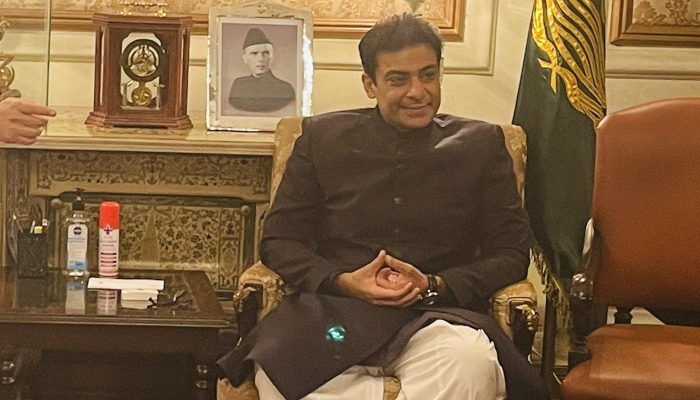LAHIORE: A three member bench of the Supreme Court on Saturday ordered that Hamza Shahbaz could only exercise temporary limited powers as a trustee till Monday on a constitutional petition filed by Punjab Assembly Speaker Parvez Elahi challenging deputy speaker’s ruling of excluding 10 votes from the counting for the election of Punjab chief minister.
Special bench headed by Chief Justice Umar Ata Bandial and comprising Justice Ijazul Ahsan and Justice Munib Akhtar assembled at the SC Lahore Registry on Saturday to hear the petition.
During the hearing the bench observed that prima facie the ruling of the Punjab Assembly deputy speaker appeared to be contrary to the provisions of Article 63A of the Constitution and the judgement of the Supreme Court and hence the election of the chief minister Punjab was under cloud.
Barrister Syed Ali Zafar appeared on behalf of Parvez Elahi and argued that the election for the Chief Minister Punjab was held on July 22 under the auspices of the Supreme Court’s judgement in which two candidates participated namely Parvez Elahi and Hamza Shahbaz Sharif.
He pointed out that Parvez Elahi secured 186 votes out of which 176 votes belonged to PTI and 10 votes belonged to PML-Q members whereas Hamza Shahbaz Sharif received 179 votes.
Barrister Zafar claimed that under Article 130(4) of the Constitution, Parvez Elahi was the constitutionally elected Chief Minister. However, the Deputy Speaker, with mala fide intention, instead of declaring Parvez Elahi as the returned Chief Minister, passed a ruling by saying that the votes of the 10 PML-Q members were not to be counted and for that purpose the Deputy Speaker relied on the judgement of the Supreme Court regarding interpretation of Article 63-A.
Barrister Zafar pointed out that Article 63A of the Constitution was in two parts. The first part stated that if a parliamentary party decided that its members were to cast the vote in favor of a particular candidate for the Chief Minister and the members violated that direction of the parliamentary party then they could be disqualified under Article 63A.
[embedpost slug=”ahsan-iqbal-blames-imran-khan-for-destruction-of-economy/”]
“For the process of disqualification, the implementation has to be carried out by the party head. Similarly, the judgement of the Supreme Court passed in Presidential Reference also confirmed that Article 63A becomes applicable only when the parliamentary party makes a decision and the member refuses to follow the decision of the parliamentary party relating to voting of the Chief Minister,” he said.
Barrister Zafar argued that nowhere in Article 63A or the judgement of the Supreme Court passed in Presidential Reference it was said that the directions could be given by the party head instead of the parliamentary party.
Pointing out to the case at hand, he said that in the present instance, the parliamentary party of PML-Q consisted of 10 members and all 10 members decided that in the election for Chief Minister Punjab PML-Q would vote for Parvez Elahi and in fact all 10 did vote for Parvez in the election. “This was the decision of PML-Q/parliamentary party and hence none of the members violated it and Article 63A was not applicable.
“Yet the Deputy Speaker in his ruling relied on a letter from Ch. Shujaat Hussain who claimed to be the party head and decided that because the directions of the party head had been violated, therefore the decision of the parliamentary party is overruled and hence the votes of all the 10 PML-Q members are to be discarded.
“For this purpose the Deputy Speaker wrongly relied upon the judgement of the Supreme Court because the Supreme Court judgement does not say that if the party head directions are violated then Article 63A becomes applicable and instead, to the contrary, decides that it is only when the directions of the parliamentary party are contravened that 63A applies,” he said.
He submitted that the ruling was hence unconstitutional and illegal and liable to be set aside as a consequence of which Parvez Elahi was to be declared as the Chief Minister Punjab.
After hearing the learned counsel, the Court passed a short order directing the Deputy Speaker to appear in person and explain the validity of his ruling and particularly how and why he relied upon the judgement of the Supreme Court for the same.
The court also said that the case involved not the interpretation of the law but rather whether the Deputy Speaker had correctly understood the judgement of the court. Notices were also issued to the Advocate General and Attorney General and the case was fixed for 2 pm.
The hearing resumed again at 2:30 pm but because of a large number of lawyers present in the Courtroom, the hearing was shifted to another room where counsels of the parties were present. The Court then heard the counsels for the respondents and repeatedly asked one question as to how the Deputy Speaker relied on the Supreme Court judgement in his ruling. Deputy Speaker Dost Muhammad Mazari did not appear and instead senior lawyer Irfan Qadir tendered power of attorney on his behalf.
The court asked the counsel to explain how a party head issued a direction contrary to the parliamentary party and what would be the consequences of striking down the deputy speaker’s ruling. Irfan Qadir sought time which the court allowed and directed deputy speaker to present the assembly record pertaining to the chief minister election and the letter sent by PML-Q party head Ch Shujat Hussain.
The court will resume hearing on Monday at Islamabad principal seat.



















